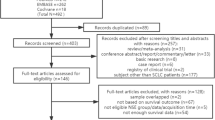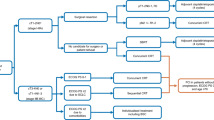Abstract
Purpose
The prognostic factors for the survival of small cell lung cancer (SCLC) patients are still widely debated. The aim of this study was to identify the clinical features and prognostic factors in SCLC patients.
Methods
A retrospective study was conducted on SCLC patients who were treated in our hospital between July 2010 and July 2015. Comparison of overall survival (OS) was performed using the Kaplan–Meier method. Prognostic factors for OS were identified by multivariate Cox regression models.
Results
A total of 523 patients with complete data and ECOG 0-2 were enrolled in our study. A total of 383 patients (73.2%) were diagnosed with ES-SCLC (extensive-stage SCLC) and 140 patients (26.8%) were diagnosed with LS-SCLC (limited-stage SCLC). In all patients, early disease stage, good ECOG, normal neuron-specific enolase (NSE), thoracic radiotherapy, ≥4 cycles of chemotherapy, prophylactic cranial irradiation, good response to initial therapy were independent favorable prognostic factors for OS, along with gender, age, CEA and CA125. In LS-SCLC patients, normal NSE, normal CEA, good response to initial therapy and surgery were independent favorable prognostic factors for OS. In ES-SCLC patients, good ECOG, normal NSE, thoracic radiotherapy, ≥4 cycles of chemotherapy, prophylactic cranial irradiation and good response to initial therapy were independent favorable prognostic factors for OS. Remarkably, NSE and response to initial therapy were independent prognostic factors for OS in all SCLC patients, LS-SCLC patients and ES-SCLC patients.
Conclusion
The normal NSE and good response to initial therapy predicted a better survival for SCLC patients, regardless of disease stage.


Similar content being viewed by others
References
Hann CL, Rudin CM. Management of small-cell lung cancer: incremental changes but hope for the future. Oncology. 2008;22(13):1486–92.
Yu JB, Decker RH, Detterbeck FC, Wilson LD. Surveillance epidemiology and end results evaluation of the role of surgery for stage I small cell lung cancer. J Thorac Oncol: Off Publ Int Assoc Study Lung Cancer. 2010;5(2):215–9. doi:10.1097/JTO.0b013e3181cd3208.
Foster NR, Mandrekar SJ, Schild SE, Nelson GD, Rowland KM Jr, Deming RL, et al. Prognostic factors differ by tumor stage for small cell lung cancer: a pooled analysis of North Central cancer treatment group trials. Cancer. 2009;115(12):2721–31. doi:10.1002/cncr.24314.
Yip D, Harper PG. Predictive and prognostic factors in small cell lung cancer: current status. Lung Cancer. 2000;28(3):173–85.
Schneider BJ, Saxena A, Downey RJ. Surgery for early-stage small cell lung cancer. J Natl Compr Cancer Netw: JNCCN. 2011;9(10):1132–9.
Hong X, Xu Q, Yang Z, Wang M, Yang F, Gao Y, et al. The value of prognostic factors in Chinese patients with small cell lung cancer: a retrospective study of 999 patients. Clin Respir J. 2016;. doi:10.1111/crj.12534.
Micke P, Faldum A, Metz T, Beeh KM, Bittinger F, Hengstler JG, et al. Staging small cell lung cancer: veterans Administration Lung Study Group versus International Association for the Study of Lung Cancer—what limits limited disease? Lung Cancer. 2002;37(3):271–6.
Eisenhauer EA, Therasse P, Bogaerts J, Schwartz LH, Sargent D, Ford R, et al. New response evaluation criteria in solid tumours: revised RECIST guideline (version 1.1). Eur J Cancer. 2009;45(2):228–47. doi:10.1016/j.ejca.2008.10.026.
Wu C, Li F, Jiao SC. Prognostic factors for survival of patients with extensive stage small cell lung cancer–a retrospective single institution analysis. Asian Pac J Cancer Prev: APJCP. 2012;13(10):4959–62.
Eskandar A, Ahmed A, Daughtey M, Kenderian S, Mahdi F, Khan A. Racial and sex differences in presentation and outcomes of small cell lung cancer in the United States: 1973 to 2010. Chest. 2015;147(4):e164–5. doi:10.1378/chest.14-3051.
Wheatley-Price P, Ma C, Ashcroft LF, Nankivell M, Stephens RJ, White SC, et al. The strength of female sex as a prognostic factor in small-cell lung cancer: a pooled analysis of chemotherapy trials from the Manchester Lung Group and Medical Research Council Clinical Trials Unit. Ann Oncol: Off J Eur Soc Med Oncol/ESMO. 2010;21(2):232–7. doi:10.1093/annonc/mdp300.
Quon H, Shepherd FA, Payne DG, Coy P, Murray N, Feld R, et al. The influence of age on the delivery, tolerance, and efficacy of thoracic irradiation in the combined modality treatment of limited stage small cell lung cancer. Int J Radiat Oncol Biol Phys. 1999;43(1):39–45.
Yuen AR, Zou G, Turrisi AT, Sause W, Komaki R, Wagner H, et al. Similar outcome of elderly patients in intergroup trial 0096: cisplatin, etoposide, and thoracic radiotherapy administered once or twice daily in limited stage small cell lung carcinoma. Cancer. 2000;89(9):1953–60.
Isgro MA, Bottoni P, Scatena R. Neuron-specific enolase as a biomarker: biochemical and clinical aspects. Adv Exp Med Biol. 2015;867:125–43. doi:10.1007/978-94-017-7215-0_9.
Huang Z, Xu D, Zhang F, Ying Y, Song L. Pro-gastrin-releasing peptide and neuron-specific enolase: useful predictors of response to chemotherapy and survival in patients with small cell lung cancer. Clin Transl Oncol: Off Publ Fed Span Oncol Soc Natl Cancer Inst Mex. 2016;18(10):1019–25. doi:10.1007/s12094-015-1479-4.
Petrovic M, Bukumiric Z, Zdravkovic V, Mitrovic S, Atkinson HD, Jurisic V. The prognostic significance of the circulating neuroendocrine markers chromogranin A, pro-gastrin-releasing peptide, and neuron-specific enolase in patients with small-cell lung cancer. Med Oncol. 2014;31(2):823. doi:10.1007/s12032-013-0823-1.
Buil-Bruna N, Lopez-Picazo JM, Moreno-Jimenez M, Martin-Algarra S, Ribba B, Troconiz IF. A population pharmacodynamic model for lactate dehydrogenase and neuron specific enolase to predict tumor progression in small cell lung cancer patients. The AAPS J. 2014;16(3):609–19. doi:10.1208/s12248-014-9600-0.
Maxwell P. Carcinoembryonic antigen: cell adhesion molecule and useful diagnostic marker. Br J Biomed Sci. 1999;56(3):209–14.
Zhu H, Guo H, Li M, Zhang Y, Han A, Shi F, et al. Increased serum carcinoembryonic antigen level can predict poor survival of patients with small cell lung cancer. Transl Res: J Lab Clin Med. 2015;166(4):355–65. doi:10.1016/j.trsl.2015.04.005.
Holdenrieder S, von Pawel J, Dankelmann E, Duell T, Faderl B, Markus A, et al. Nucleosomes, ProGRP, NSE, CYFRA 21-1, and CEA in monitoring first-line chemotherapy of small cell lung cancer. Clin Cancer Res: Off J Am Assoc for Cancer Res. 2008;14(23):7813–21. doi:10.1158/1078-0432.CCR-08-0678.
Bast RC Jr, Badgwell D, Lu Z, Marquez R, Rosen D, Liu J, et al. New tumor markers: CA125 and beyond. Int J Gynecol Cancer: Off J Int Gynecol Cancer Soc. 2005;15(Suppl 3):274–81. doi:10.1111/j.1525-1438.2005.00441.x.
Ando S, Suzuki M, Yamamoto N, Iida T, Kimura H. The prognostic value of both neuron-specific enolase (NSE) and Cyfra21-1 in small cell lung cancer. Anticancer Res. 2004;24(3b):1941–6.
Simon G, Ginsberg RJ, Ruckdeschel JC. Small-cell lung cancer. Chest Surg Clin North Am. 2001;11(1):165–88, ix.
Fried DB, Morris DE, Poole C, Rosenman JG, Halle JS, Detterbeck FC, et al. Systematic review evaluating the timing of thoracic radiation therapy in combined modality therapy for limited-stage small-cell lung cancer. J Clin Oncol: Off J Am Soc Clin Oncol. 2004;22(23):4837–45. doi:10.1200/JCO.2004.01.178.
Slotman BJ, van Tinteren H, Praag JO, Knegjens JL, El Sharouni SY, Hatton M, et al. Use of thoracic radiotherapy for extensive stage small-cell lung cancer: a phase 3 randomised controlled trial. Lancet. 2015;385(9962):36–42. doi:10.1016/S0140-6736(14)61085-0.
Auperin A, Arriagada R, Pignon JP, Le Pechoux C, Gregor A, Stephens RJ, et al. Prophylactic cranial irradiation for patients with small-cell lung cancer in complete remission. Prophylactic Cranial Irradiation Overview Collaborative Group. N Engl J Med. 1999;341(7):476–84. doi:10.1056/NEJM199908123410703.
Slotman B, Faivre-Finn C, Kramer G, Rankin E, Snee M, Hatton M, et al. Prophylactic cranial irradiation in extensive small-cell lung cancer. N Engl J Med. 2007;357(7):664–72. doi:10.1056/NEJMoa071780.
Le Pechoux C, Dunant A, Senan S, Wolfson A, Quoix E, Faivre-Finn C, et al. Standard-dose versus higher-dose prophylactic cranial irradiation (PCI) in patients with limited-stage small-cell lung cancer in complete remission after chemotherapy and thoracic radiotherapy (PCI 99-01, EORTC 22003-08004, RTOG 0212, and IFCT 99-01): a randomised clinical trial. Lancet Oncol. 2009;10(5):467–74. doi:10.1016/S1470-2045(09)70101-9.
Rudin CM, Ismaila N, Hann CL, Malhotra N, Movsas B, Norris K, et al. Treatment of small-cell lung cancer: American Society of Clinical Oncology Endorsement of the American College of Chest Physicians Guideline. J Clin Oncol: Off J Am Soc Clin Oncol. 2015;33(34):4106–11. doi:10.1200/JCO.2015.63.7918.
Manapov F, Niyazi M, Gerum S, Roengvoraphoj O, Eze C, Li M, et al. Evaluation of the role of remission status in a heterogeneous limited disease small-cell lung cancer patient cohort treated with definitive chemoradiotherapy. BMC Cancer. 2016;16:216. doi:10.1186/s12885-016-2245-x.
Acknowledgements
This work was supported by grants from the Science and Technology Innovation Nursery Fund Project of PLA General Hospital (16KMM39).
Author information
Authors and Affiliations
Corresponding author
Ethics declarations
Conflict of interest
The authors declare that they have no conflict of interest.
Informed consent
Informed consent was obtained from all individual participants included in the study.
Research involving human participants and/or animals
For this type of study formal consent is not required.
Additional information
M. Zhou, Z. Wang, and Y. Yao contributed equally to this work.
Rights and permissions
About this article
Cite this article
Zhou, M., Wang, Z., Yao, Y. et al. Neuron-specific enolase and response to initial therapy are important prognostic factors in patients with small cell lung cancer. Clin Transl Oncol 19, 865–873 (2017). https://doi.org/10.1007/s12094-017-1617-2
Received:
Accepted:
Published:
Issue Date:
DOI: https://doi.org/10.1007/s12094-017-1617-2




